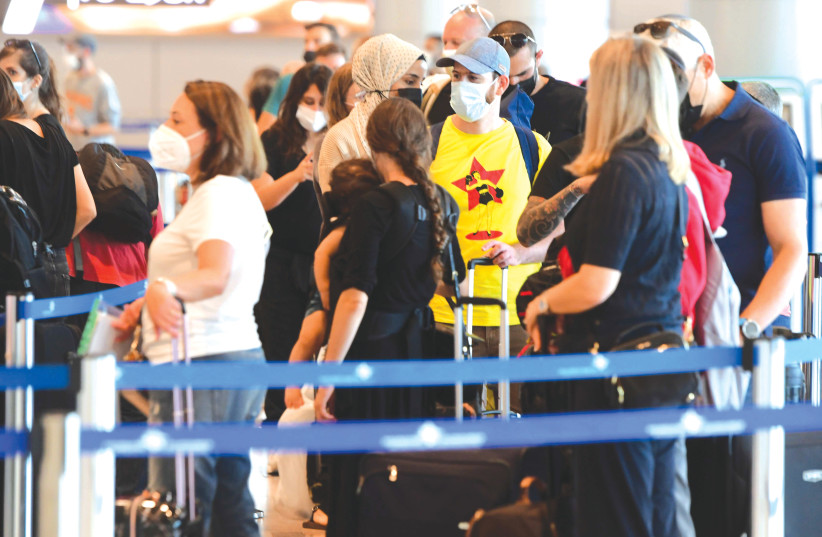Confusion continued a day after Rosh Hashanah surrounding the quarantine policy for incoming travelers vaccinated abroad.
For many Jews around the world, this holiday period was supposed to mark a return to vacationing in Israel. As in the spring and early summer, the country reopened to vaccinated tourist groups and announced it would soon do the same for individuals.
As a result, a lot of people rushed to book flights and hotels. But as the Delta variant began to rage and the plan to open the skies was indefinitely postponed, the hope proved wishful thinking for many disappointed would-be travelers.
The one category of foreign nationals who can still receive special permission to visit as tourists are vaccinated or recovered first-degree relatives of Israeli citizens.
However, as during August, a vast majority of the countries were added to the list from which incoming travelers had to quarantine for at least one week, and a simple trip to Israel became more challenging.
When the Health Ministry announced radical changes in its quarantine policy at the end of the month, many hoped the new rules would also apply to foreign visitors.
The new policy exempts from full isolation those individuals who have received a third shot, who have been jabbed twice or recovered in the last six months, or those who have recovered and received one shot.
But at the moment, Israel does not recognize any foreign vaccination or recovery documentation.

Non-citizens who want to enter the country have to present their certificates in order to receive the permission required to enter, but once in Israel, if they want to be considered immunized, they need to undergo a private serological test to prove the presence of antibodies.
Once they do, they also receive an Israeli recovery certificate based on the serology test performed in Israel and not elsewhere.
The ministry’s first statement about the new quarantine policy did not contain anything to suggest that the exemption from isolation would not apply to individuals holding such certificates based on serology results.
Subsequent versions, however, required recovery certificates to be based on a PCR test performed in Israel.
The new policy came into effect on Friday, sending reservations soaring for flights and vacations abroad for Israelis during the holiday period.
Meanwhile, no good news came for incoming visitors from abroad, although several health officials – including Coronavirus Commissioner Prof. Salman Zarka – said the rules would be changed in the near future to include individuals vaccinated abroad.
Then on Monday, just hours before Rosh Hashanah started, there came another twist.
Dov Lipman, a rabbi and activist who recently established the NGO Yad L’Olim to help new immigrants navigate Israeli bureaucracy – first and foremost to help them receive permission for their families to visit the country – announced that the Health Ministry had changed its policy again, allowing people vaccinated or recovered abroad within the previous six months to also be exempt from isolation based on a serological test.
This despite that no change in policy was officially announced.
On Wednesday night, after the end of the two-day Rosh Hashanah holiday, ministry spokesperson Anat Danieli Lev denied Lipman’s posting, and said the ministry was still working on the issue, specifically to solve the problem of proving the date of the latest vaccination/recovery, which the serological test cannot show.
On Thursday, Lipman said that a senior ministry official with whom he works on a daily basis called on Monday afternoon and asked him to publicly announce the change in policy, telling him there was no need for an official announcement but just to get the word out to people.
“I reached out to her again after multiple people reported that the call center denied such new policy existed and they were told to remain in isolation, but she confirmed what she said,” Lipman said.
Later in the day, Health Ministry Director-General Prof. Nachman Ash reaffirmed that those who are vaccinated or recovered abroad at the moment need to isolate, but vowed to find a solution quickly.
“Because we used serological tests, we do not have information on the date of the vaccination,” Ash said. “We know we have to get organized fast to give a response to this problem. We are working on setting up a special call center to release those vaccinated abroad from quarantine.”
He did not specify when the center is going to be set up or how the process is going to work.
In the past, people had to upload the serological test results in a dedicated form on the Health Ministry’s website, and then wait for an official email authorizing them to leave quarantine.
Good news for those eager to visit the country – and their families – might come soon. But the aspiring travelers will need to wait a little longer, possibly until after the holidays.
